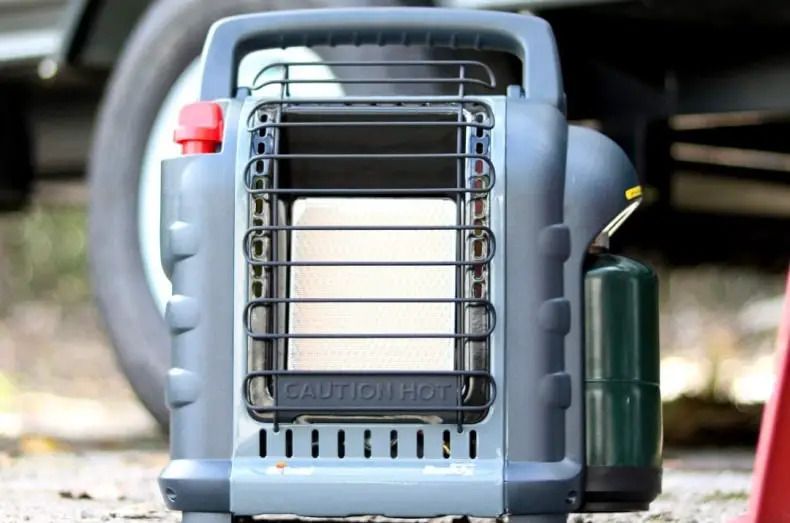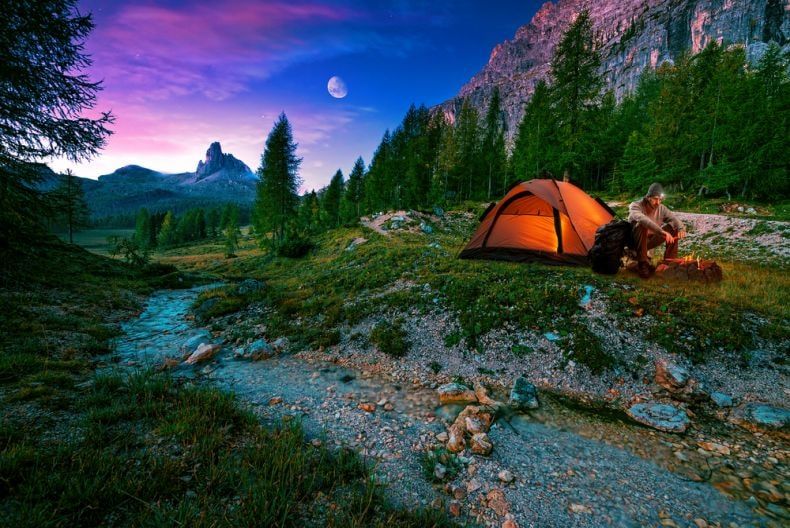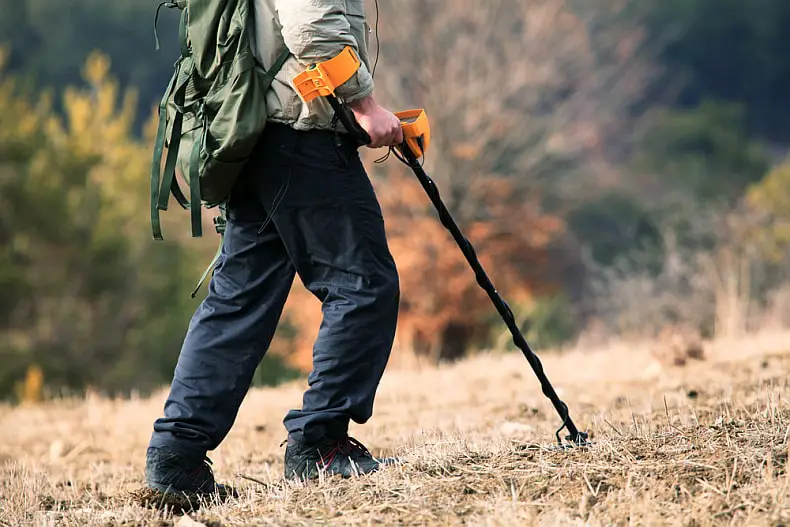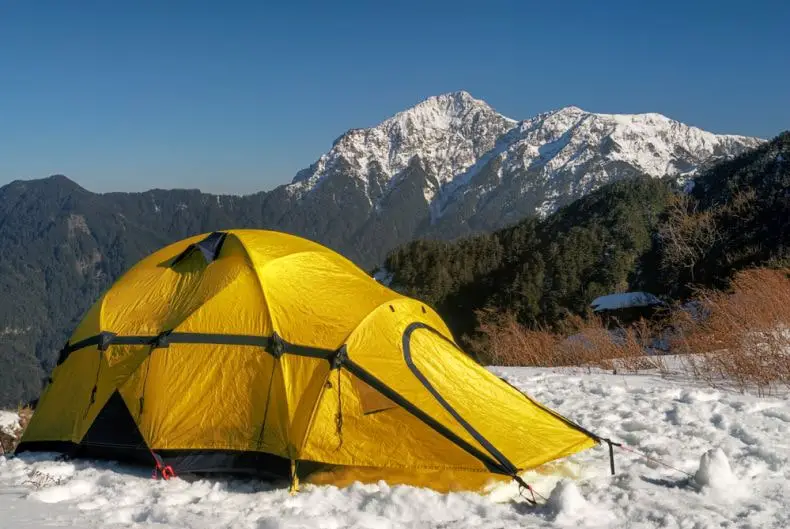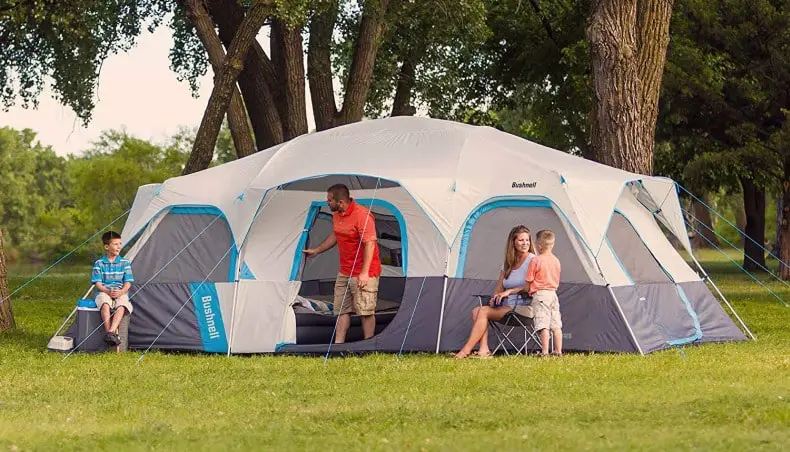Camping in the winter can get awfully chilly. There's nothing more uncomfortable than trying to sleep when its freezing inside a tent. Camping in winter weather doesn't have to be miserable though.
Obviously, the easiest way to a comfortably warm tent is with a camping heater - an essential piece of camping gear for cold weather camping. Heaters can be used to stay warm while camping, but, not all heaters are safe to use inside a tent.
In this article, we'll explain which types of heaters are tent-safe with some best heaters for tents to get your tent toasty warm on the coldest of days or nights.
Table of Contents
Types Of Tent Heaters
Heaters for tent camping can be electric, gas, or wood. There are advantages and disadvantages to each type. We'll discuss only the various heaters safe for tent heating. You can choose the best tent heater for winter camping that's safe to use inside of your tent.
Electric Heaters
Electric heaters are probably the type of portable heater you're most familiar with. They are compact and powered by an electrical outlet. Provided that you have an electric hookup, an electric heater is very simple to use without the need to worry about an additional fuel source.
There are many small electric heaters suitable for heating a tent on the market. They are generally lightweight and most will have the necessary safety features that you'll need.
The most common electric heaters are ceramic space heaters. These heaters use electricity to heat up a ceramic plate or element. A fan is usually incorporated to force air over the element into the living area to provide heat.
The major drawback to using an electric heater is that electric heaters require electricity. This can pose a big problem when camping in remote locations without an electrical source.
Gas Heaters
Gas heaters can use propane, kerosene, or butane. For safety reasons we'll discuss later, we'll only be covering catalytic type propane gas tent heaters.
A major advantage of a propane tent heater over an electric heater is that it can be used anywhere regardless of whether or not you have an electrical outlet available.
The downside to gas-powered heaters is that they rely on gas canisters to run, so you have to make sure you always have an adequate supply on hand.
Wood Stoves
Wood stoves can work very well in keeping a tent warm and cozy. The heat produced by a wood stove can radiate evenly into all areas of a tent and is most suitable for larger tents.
Wood stoves, however, are bulkier than portable heaters, requires a constant supply of wood for fuel, and requires a tent equipped with a stove jack for the vent pipe.
Despite these cons, many people still prefer the heat generated from a classic wood-burning stove.
What Features Make A Portable Heater Safe?

Knowing what features to look for in a tent heater is highly important when it comes to safety. To better understand what makes a safe tent heater, let's take a look at some of the potential hazards when using a heater in a tent.
Potential Hazards Of Portable Heaters
Below we list the most common hazards associated with portable heaters for camping.
Fire Hazard
Any heater unattended is a potential fire hazard. Flammable material in close proximity to a heat source can potentially ignite when hot enough. Even though almost any sleeping bag or tent you buy are treated with fire-retardant chemicals, they WILL burn. Clothes, blankets, pillows, and paper bags will definitely burn. Always provide plenty of distance between heaters and other items inside your tent.
Carbon Monoxide
Carbon monoxide is a poisonous gas that is produced when fuels like gas, coal, or wood do not fully burn. Carbon monoxide can be extremely dangerous in a tent because the gas is odorless and can't be detected without a CO detector.
Never use a gas heater in a closed tent unless it is a catalytic type heater. A catalytic heater is very close to being 100% efficient in fuel usage, thus preventing the formation of deadly CO.
Oxygen Depletion
Even though a catalytic heater doesn't create CO, there is still a risk of it causing oxygen depletion. Low oxygen levels can occur when the heater expends the oxygen inside the tent. To prevent low oxygen levels in the tent always leave a small opening somewhere on the tent for fresh outside air to enter.
Most Important Heater Safety Considerations
Below we list some important safety features to look for when purchasing a heater to heat your tent (or your home). Most heaters will have these features in order to be compliant with regulations, but be sure and check for them for peace of mind.
Tip-Over Safety Switch
A heater that has accidentally fallen over is a recipe for a fire. Whether, electric or gas, make sure your heater is equipped with a shutoff switch on the bottom of the unit which will immediately shut it down to prevent it from whatever source it may come in contact with.
Low Oxygen Shutoff
Some gas heaters may come with a low oxygen sensor for indoor use which detects the amount of oxygen present. If the amount of oxygen falls below the threshold, the unit will shut off.
UL or ETL Certification
Underwriters Laboratories (UL) and Intertek’s Electrical Testing Labs (ETL) are both OSAH recognized testing laboratories that test products to make sure they meet a set of predefined safety standards. Heaters that are certified by one of these laboratories usually meet more stringent safety requirements than those that are not, so it is a good factor to consider when looking for a heater.
What Is A BTU?
A BTU, or British Thermal Unit, is a measurement of energy. Specifically, it is the amount of energy required to raise 1 pound of water 1 degree Fahrenheit. It is similar to the Calorie which is the metric version - the amount of energy required to raise 1 gram of water by 1 degree Celsius.
In the case of heaters, it refers to the amount of energy the unit can produce over the period of an hour. A BTU rating is essentially a gauge of how powerful a heater is, or how well it can heat. You need to look for a heater's BTU capability as well as safety features when shopping for one comparatively. Know the size of your tent beforehand.
Wattage To BTU Conversion
Note that some heater manufacturers rate their heaters in terms of Wattage rather than BTUs. You can easily convert Wattage to BTUs with a simple multiplier. The formula is:
P(BTU/hr) = 3.412142 ⋅ P(W)
more simply put
BTUs = 3.41 x Wattage
We'll convert all of those for you in the heaters below so you can compare apples to apples.
Some Of The Best Tent Heaters Safe For Camping
Below we show you some of the best tent heaters for camping in terms of both safety and performance. We've included both electric heaters, as well as propane heaters, and for those of you who have a bit more of an adventurist spirit, we've included a wood burning tent stove.
Opolar 1500W PTC Portable Heater
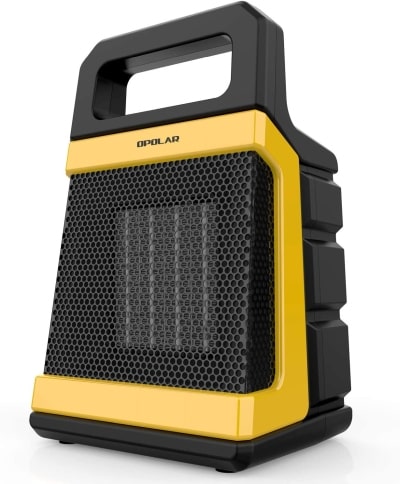
- Type: electric
- Wattage / BTUs: 1500W / 5120 BTUs
- Safety: tip-over and overheat protection, cool touch
The first tent heater on our list is the Opolar PTC Ceramic Heater. PTC stands for Positive Temperature Coefficient and is a technology that replaces the old wire heating coils with ceramic.
These are the electric tent heaters to look for because they are fast to heat but safer in the fact that they operate at a lower temperature and cool down quickly. They are also much less prone to overheating due to buildup on the heating element.
The Opolar has 3 modes of operation: High Heat, Low Heat, and Fan and includes a thermostat to help maintain a consistent temperature in the living space.
The heater will operate at a low noise level (about 30db) so sleeping is not interrupted.
Safety features include tip-over and overheat protection and a cool touch exterior.
Pros
- Fast heat
- Quiet
- Quick cool down
Cons
- Requires electrical source
Mr Heater Buddy

- Type: propane
- BTUs: 9000
- Safety: tip-over and low-oxygen shutoff
Mr Heater Buddy is one of the most popular heaters on the market, and for good reason. This heater is one great tent heater for camping. It is notable for being a propane heater that is a much safer heater to use in a tent.
This is because it is a catalytic heater which uses a catalyst to speed up the combustion reaction that occurs, burning at such a low temperature that there is virtually no flame. Catalytic heaters are so efficient (almost 100%) that they produce no carbon monoxide (CO).
Carbon monoxide is an odorless poisonous gas that is formed by incomplete combustion of a material, or when something such as gas, oil, coal, or wood doesn't fully burn. Using gas heaters that are not efficient like catalytic heaters in enclosed areas has caused numerous fatalities. Because CO is odorless, one may not realize they are in danger until it is too late.
Besides the catalytic operation of the Buddy, it offers tip-over protection in the event of an accidental tip-over as well as an oxygen depletion sensor which will shut off the unit in the event too much oxygen has been expended in the enclosed area.
The Buddy runs off of a 1 lb. propane cylinder (about 3 hours), is lightweight, has a fold-down handle, and heats up to 225 sq. ft. of area.
Pros
- 9000 BTU
- Tip-over & oxygen depletion sensor
- Uses 1 lb. cylinder
Cons
- Requires venting tent to avoid oxygen depletion
Mr Heater Little Buddy
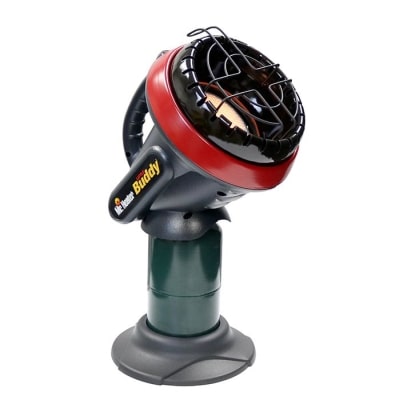
- Type: propane
- BTUs: 4000
- Safety: tip-over and low-oxygen shutoff
The Little Buddy heater is another great tent heater from Mr Heater for camping that is safe to use. Not as powerful as the Buddy, this heater has a 4000 BTU heat output but can run up to 6 hours on a 1 lb. propane cylinder. It's great for heating small tent or areas up to 95 sq. ft.
Little buddy uses the same catalytic technology as its bigger brother, so no CO is created during combustion. It also features tip-over protection and low-oxygen shutoff.
Pros
- Small
- Runs 6 hours on 1lb. cylinder
- Tip-over & low-oxygen sensor
Cons
- Lower heat output than Buddy
- Requires tent venting
Honeywell 360 Surround Heater

- Type: electric
- Wattage / BTUs: 1500W / 5120 BTUs
- Safety: 360° Safety Tip protection, overheat protection, Cool Touch handle
The Honeywell 360 Surround Heater uses a 360° forced fan technology to heat up an area from all directions. It features 2 heat settings with an adjustable thermostat for consistent temperatures.
As far as safety, the manufacturer has included an auto-off timer as well as tip-over and 2X overheat protection (sensor + backup fuse). Lastly, this unit has a Cool Touch handle for easy carrying without the threat of burns.
Pros
- Heats in all directions
- Tip and overheat protection
- Cool Touch handle
- Auto off timer
Cons
- Requires electrical source
Martin Portable Gas Catalytic Heater

- Type: propane
- BTUs: 3000
- Safety: safety fuel auto shutoff
Another great catalytic heater, the Martin Portable Gas Heater delivers 3000 BTUs of heat for smaller areas and is a great heater for camping. This heater can run up to 7 hours on a 1 lb. propane tank, cleanly, silently, and safely.
This heater has the lowest BTU output out of all the gas heaters listed but has the longest run time. The design of the foldable legs on this unit makes it very hard to tip over. Plus, this heater has a fuel shut off safety feature which shuts off the gas if the flame goes out.
Pros
- High portability
- Runs 7 hours on 1lb. cylinder
- Flame out shutoff feature
Cons
- Lower heat output (3000 BTU)
ISILER Portable Ceramic Space Heater
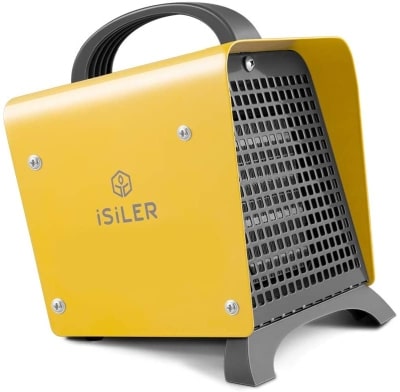
- Type: electric
- Wattage / BTUs: 1500W / 5120 BTUs
- Safety: tip-over, and overheat protection
Experience a fast warmup with the Isler Portable Ceramic Space Heater. Control the temperature precisely with the thermostat control ranging from 41°F-95°F. With a low-noise fan and no irritating red light, this heater won't inhibit your rest and relaxation while getting toasty warm.
Made from flame-resistant materials, this heater conforms to ETL and UL requirements. It won't consume oxygen like gas heaters and is flameless with its use of ceramic technology. It will heat up to 108 sq. ft and will stop heating automatically if the internal heater temperature reaches 176°F for overheat protection.
Pros
- Fast heat
- Quiet
- Overheat protection
Cons
- Requires electrical source
Winnerwell Fastfold Titanium Tent Stove
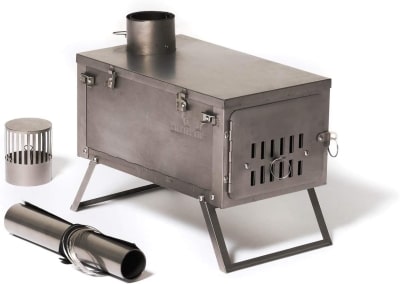
- Type: wood stove
- Weight: 4 lbs.
- Safety Features: spark arrestor
For those looking for an ultralight tent stove, the Winnerwell Fastfold Titanium Tent Stove is the perfect solution with a compatible tent with a stove jack. Made of titanium, this stove is not only super light, but is very efficient at transferring heat. It can hold hot coals for hours and heat up a tent in the coldest of weather.
This stove folds to a very compact size, and at 4 lbs. is perfect for backpackers. It includes 9 ft. of 3-inch diameter pipe as well as a spark arrestor with guy tie points for stability and safety. Included are dampers in the door and lid to control the burn rate.
Pros
- Lightweight titanium
- Compact
- Spark arrestor
Cons
- Requires wood
- Proper venting required
Additional Safety Considerations For Using A Portable Tent Heater For Camping
Even though these heaters are considered safe when used as intended, there are additional precautions to consider for maximum safety:
- Unless it is extremely cold, use the heater at night to only heat up the tent just before going to sleep. It's best not to leave a tent heater on all night.
- With electric heaters, use the shortest extension cord possible with at least 14 gauge conductors. Excessive length and wires that are too small add resistance which causes heat and the potential for fire.
- Route extension cords to minimize tripping hazards and to avoid tipping the heater.
- With gas heaters, including a catalytic heater, it's a good idea to use a carbon monoxide detector in the event of a malfunction.
- Unplug any electric heater when not in use.
- Never leave the campsite with a heater running in a tent.
- Never use a gas heater in a tent that is not a catalytic heater without plenty of ventilation.
Conclusion
You don't have to wait for warm weather to get back outdoors. Hopefully, you are now armed with enough information to find the best tent heater for your next camping trip.
With a safe tent heater, you can beat the cold and continue to enjoy camping. Know your heating requirements before choosing a heater. All of the heaters listed should be sufficient for most tents. If you have an extremely large tent be sure to take that into consideration beforehand.
With a little knowledge, common sense, and using the right heater for your tent, staying warm while winter camping doesn't have to be dangerous.

